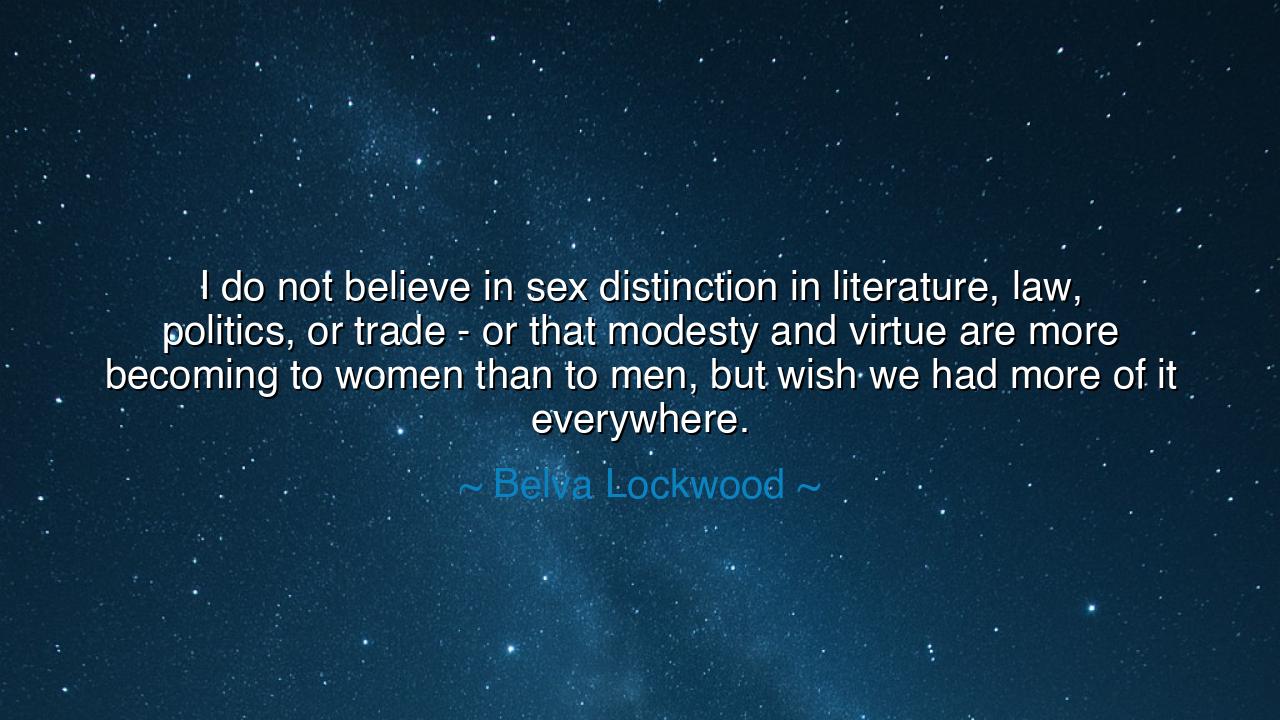
I do not believe in sex distinction in literature, law
I do not believe in sex distinction in literature, law, politics, or trade - or that modesty and virtue are more becoming to women than to men, but wish we had more of it everywhere.






The words of Belva Lockwood rise with the strength of a trumpet blast against the walls of prejudice: “I do not believe in sex distinction in literature, law, politics, or trade—or that modesty and virtue are more becoming to women than to men, but wish we had more of it everywhere.” In this single declaration, she dismantles the false boundaries that mankind has long placed between men and women. She speaks not only as one who demanded equality for women, but as one who demanded integrity for all humanity. Her words are at once a rebuke and a vision: a rebuke to those who confined virtue to women alone, and a vision of a world where every soul—man or woman—would live by honor and truth.
Lockwood herself was no stranger to battle. In the nineteenth century, when women were barred from practicing law, she broke through the barriers with courage, becoming the first woman admitted to practice before the United States Supreme Court. Her life was proof of her conviction: that sex distinction was a false idol, upheld not by truth but by tradition and fear. She had to fight where men were welcomed freely, yet she triumphed, showing that talent and perseverance know no gender. Her quote is not mere theory—it is the cry of a warrior who lived what she proclaimed.
In her words lies also a subtle rebuke of hypocrisy. Society often demanded modesty and virtue of women while excusing men from the same standards. Lockwood’s wisdom cuts through this falsehood: why should purity, humility, and righteousness be chained only to women? Should not men also walk in integrity? She flips the burden from being a cage for women to being a universal call for all humanity. What she desired was not less virtue in women, but more virtue everywhere, until righteousness would no longer be confined by gender.
History confirms her insight. In ancient times, Rome demanded chastity of its women, but celebrated excess and vice in its men. This imbalance led to corruption, cruelty, and eventually collapse. Conversely, in Sparta, men and women were both trained in discipline, both taught the value of honor, and thus their society endured with unusual strength for centuries. Lockwood’s words remind us that civilizations rise not on the inequality of virtue, but on its universality.
Her vision also speaks prophetically to the modern age. In literature, we now see voices of women and men shaping cultures equally. In trade and politics, women stand in parliaments, boardrooms, and courts once barred to them. Yet Lockwood’s warning still endures, for the challenge is not only equality of opportunity, but equality of responsibility. If corruption and greed remain among men, then society falters no matter how far women advance. Equality is not complete until both sexes share not only power, but also the burden of virtue.
The lesson, O seeker, is clear: abandon the false notion that virtue is gendered. Honor, humility, and justice belong to all, and should be demanded of all. If you are a man, do not expect from women a purity you neglect in yourself. If you are a woman, do not believe that strength or intelligence diminishes your femininity. Walk as Lockwood walked, unchained by sex distinction, and judge not by gender but by the content of character.
Practical wisdom flows from her cry: when you raise children, teach both sons and daughters alike in integrity. When you work, honor equally the skills of men and women. When you govern, judge not by gender but by merit. And in yourself, do not excuse sin because of tradition or sex, but seek always to embody the virtue you would demand from others.
So let Belva Lockwood’s words echo through the centuries: “I do not believe in sex distinction… but wish we had more virtue everywhere.” For in them lies a double-edged truth: equality without virtue is chaos, and virtue without equality is injustice. Only when both meet, in men and in women alike, can humanity rise to its destined greatness.






AAdministratorAdministrator
Welcome, honored guests. Please leave a comment, we will respond soon